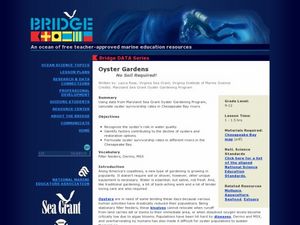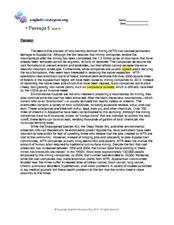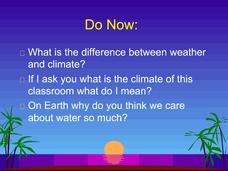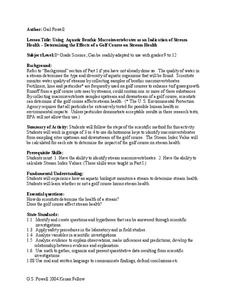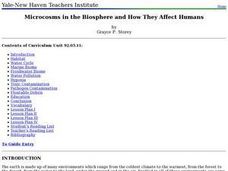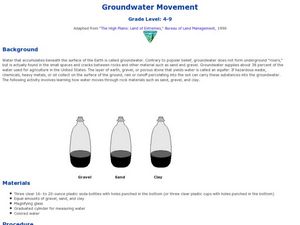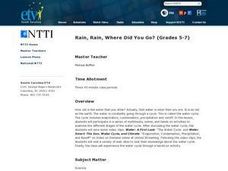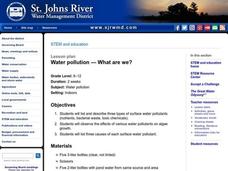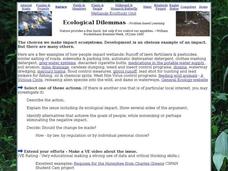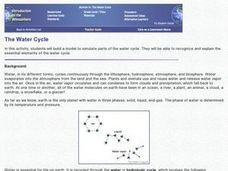Curated OER
Oyster Gardens - No Soil Required!
Explore the practice of oyster gardening. Because oysters play a vital role in marine ecosystems and their populations have declined, biologists are transplanting oyster seed to repopulate reefs. After learning about this practice,...
K12 Reader
Water Water Everywhere
The protection of our water supply is the subject of an article used in this cross-curricular reading comprehension worksheet. After studying the passage, readers use information from the text to respond to a series of comprehension...
Curated OER
Reading Comprehension 5: Level 10
Whether used as a reading comprehension assessment, as the basis of a mini-lesson on reading strategies, or as extra practice, this exercise will prove to be valuable because of the answers and explanation key that accompanies the...
University of Wisconsin
Conjunction Function
As part of a unit, this lesson familiarizes youngsters with components of a rain garden. They speculate about the role of an assigned component in contributing to a rain garden, and ultimately, in the health of the local watershed. Each...
Rivanna Regional Stormwater Education Partnership
Invisible Passengers
How does water pollution affect the organisms living in the water? Use three science experiments to examine how erosion and other pollutants can affect water quality. Each experiment focuses on a different aspect of pollution and...
May Media Group
Treatment Plants
Young scientists explore nature's water treatment plants in this simple science demonstration. By placing a stalk of celery in a cup of water mixed with food coloring, children are able to observe how plants absorb nutrients and...
Curated OER
Acid Rain
Create a simulation of acid rain in your classroom with lemon juice and bean plants to help kids study the effects of pollution on plants. In addition, learners will listen to a story and write responses based on guiding questions.
Port Jefferson School District
Water and Climate
Dive into a lesson on the hydrosphere with this Powerpoint presentation. Building on prior knowledge of the water cycle, young scientists learn what happens to water after it falls as precipitation and explore the different factors...
Florida Department of Environmental Protection
Water's Journey Expedition
Step into a scientist's shoes to go online and discover the Florida Springs Expedition, and participate in two activities focusing on how humans impact the environment. The first activity asks scholars to summarize the six dispatches at...
Kenan Fellows
Determining the Effects of a Golf Course on Stream Health
Do golf courses affect the water organisms in nearby streams and ponds? Small groups collect samples of water upstream and downstream from a golf course and analyze the macroinvertebrates found and the stream index values of the two...
Global Oneness Project
Rethinking the Fabrics We Wear
What are fibersheds and what what do they have to do with environmental protections? A photo essay and audio recordings about Mimi Luebbermann, and her sheep, cause consumers to reflect on how their clothing choices can support local...
Global Oneness Project
Protecting Wilderness
Would you live in a tree for three years to protect a redwood forest? Viewers of Rainhouse Cinema's Among Giants documentary consider the actions of Earth First! environmental activists who moved into the treetops of a grove of giant...
Michigan Sea Grant
What's in This Water?
Pupils investigate the biological and chemical characteristics of water to determine where purple loosestrife occurs. They create data sheets to record water quality tests in several locations and work in groups to conduct the water...
Curated OER
Business Responsibility to Wetlands
Eighth graders discuss the responsibilities of businesses to protect local wetlands. In groups, they participate in numerous activities and create a model of a wetland to discover how it functions. They are given a quiz to end the lesson.
Curated OER
Rock River Watershed
Middle schoolers discover what a watershed is and which one they live in. Using the internet, they research why watersheds are important to an ecosystem and how to keep them from getting polluted. They use a map to locate various items...
Curated OER
Science: Microcosms in the Biosphere
In a series of lessons, examine the impact on humans by microcosms in the biosphere. Among the plans structured for students with different abilities and learning styles, are activities describing the symbiotic relationship, drawing the...
Curated OER
Groundwater Movement
Young scholars study groundwater movement beneath the surface of the Earth. In this agriculture lesson, students experiment with how water moves through rock materials such as sand, gravel, and clay.
University of Wisconsin
A Rain Garden Year
Pupils become plants in an interpretive play that depicts what happens throughout the seasons in a rain garden. As you narrate, students bloom, flower, and go to seed accordingly. The lesson is first in a series of lessons written for...
Curated OER
Rain, Rain, Where Did You Go?
Young scholars study the water cycle including condensation, evaporation, and precipitation. In this water cycle lesson, students watch a video and access assigned web sites to investigate the water cycle. They complete an experiment...
Curated OER
What Are We?
Students list and describe three types of surface water pollutants. They observe the effects of various water pollutants on algae growth. Three causes of each surface water pollutant is listed.
Curated OER
Hydrologic Cycle
In this science worksheet, students read about the Hydrologic Cycle. Students use the reading and a diagram to answer 2 comprehension questions.
Curated OER
Comparison of Different Methods for Determining Stream Flow at a Stream Site
Students make measurements and calculations to determine the stream flow of an outdoor stream site. In this stream characteristics lesson, students travel to a field site to construct a transect across a stream and measure the stream's...
Curated OER
Ecological Dilemmas in Wetlands
In this ecological dilemmas in wetlands learning exercise, learners select a topic, use the links to websites for research, describe the topic, explain its impact on wetlands, identify alternatives and decide on possible changes. An...
Curated OER
The Water Cycle--Model Simulation
Learners build a model to simulate parts of the water cycle. They recognize and explain the essential elements of the water cycle.
Other popular searches
- Storm Water Runoff
- Contaminated Runoff
- Water Runoff
- Surface Runoff
- The Water Cycle Runoff
- Urban Runoff
- Rain Runoff
- Stormwater Runoff
- Water Cycle Runoff
- Algal Bloom Runoff
- Catfish and Runoff
- Polluted Runoff


